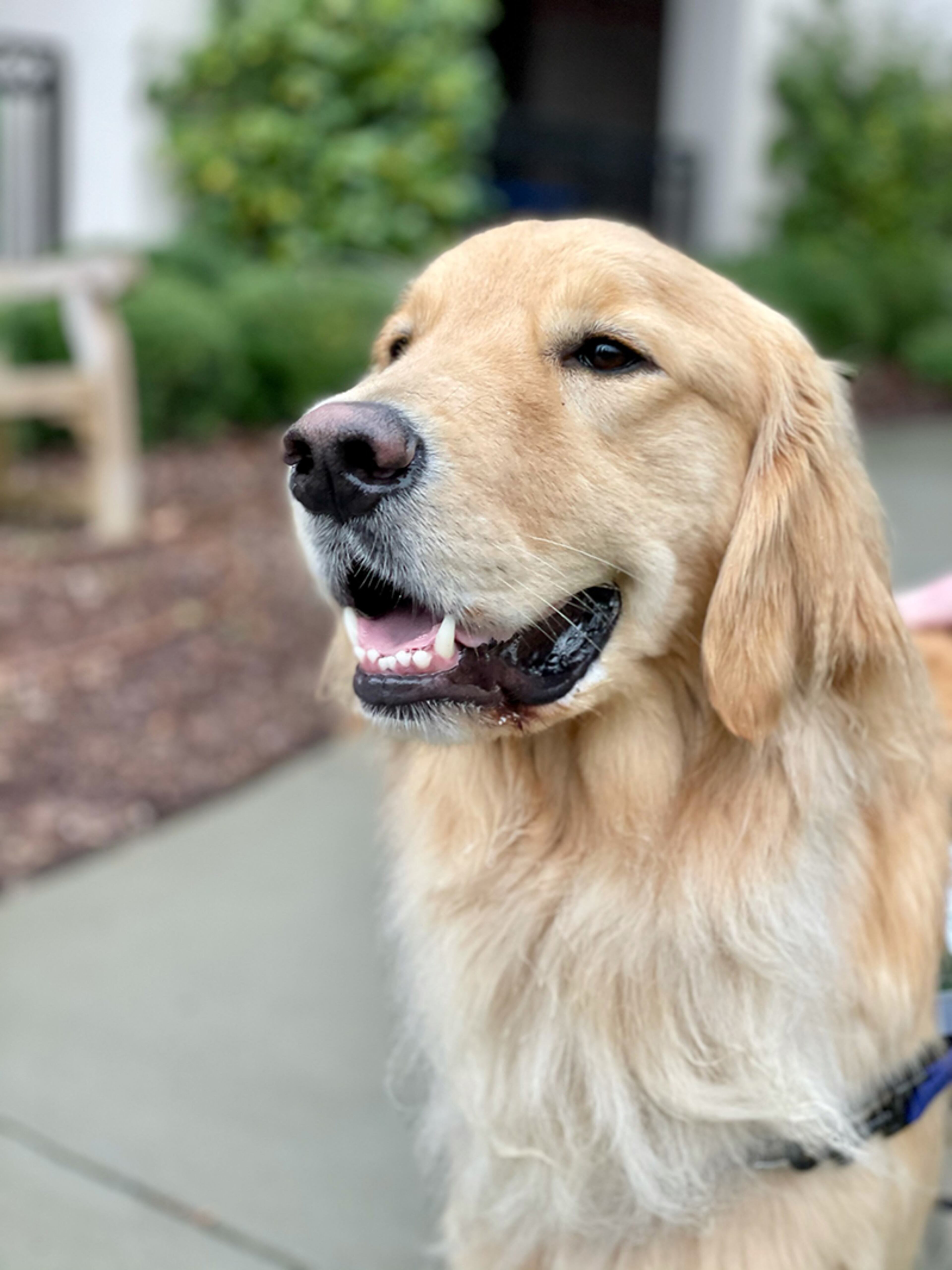Canines For Kids program ‘a powerful thing’ for kids battling illness
Ares, in Greek mythology, is known as the god of war. It’s more accurate, Encyclopaedia Britannica points out, to call him him the spirit of battle.
So the newest employee at the Aflac Cancer and Blood Disorders Center is aptly named, even if he spells it like the zodiac sign and not the Greek god.
Meet Aries, the 4-year-old golden retriever who helps children and families in their battle against cancer.
Aries is one of 14 dogs — 12 retrievers and a couple of labradoodles — in the Canines for Kids program at Children’s Healthcare of Atlanta, and they’re trained to not only provide love and comfort, but also to help clinical teams in providing treatment to patients.

Although he started just two weeks ago, Aries is already proving to be an asset.
“So many kids can’t have a dog at home, so this is a powerful thing for them,” said Jessica Westbrooks, a child life specialist at the center and Aries’ primary handler.
On Monday morning, Aries joined Westbrooks as she worked with a boy who needed to have a port inserted for his cancer treatment.
“His mom said they aren’t allowed to have dogs where they live,” Westbrooks said. “She said this was really huge and meaningful for him, because he loves dogs so much. And Aries just hopped up on his bed, basically almost in his lap.”
Instead of fretting about being sedated and having another procedure, the boy spent his morning petting Aries. That makes Westbrooks’ job easier, too. As a child life specialist, she works with young patients to ensure they not only understand what is happening to them but also helping them cope with what they’re going through.
“I think that for our patients, animal-assisted therapy is a wonderful resource to promote coping with pain, nausea, anxiety and stress when sometimes many other coping strategies might not be as beneficial,” she said.
The kids “love working with me and coping in our conversations,” she said, “but I think working with the dog helps some conversations happen that wouldn’t have. They often let their walls down when they’re with a dog.”
Westbrooks has been working with kids as a child life specialist for about seven years, six of them at the blood outpatient center.
“Part of our role is to provide education about what’s going on with your body,” she said. “In this case, I mainly educate about cancer to kids ranging from as young as they can start to understand — maybe 2 or 3 years old — into young adulthood, and helping them cope with whatever they’re experiencing in that journey.”
After being at the center for about six years, Westbrooks was ready to try something different, especially after the year we’ve all been through because of the coronavirus pandemic.
“I used to travel a lot, but now I’m not doing that. And I just moved into a home where I have space for a dog, so all of the stars aligned for this opportunity,” she said. “A dog working beside me can help promote coping and help me as I do my job.”
The Canines For Kids program started at Children’s in 2009 and was the first of its kind in the country. Each of the 14 dogs has a Children’s employee handler who is responsible for caring and managing the dog. The canines are placed only once and live with their primary handler, so Westbrooks and Aries will be partners for years.
The dogs aren’t at the hospitals and facilities just to get their ears scratched, however. They have jobs to do. They are trained to:
» decrease anxiety and stress associated with the hospital environment and to increase normalization of the surroundings.
» support the overall social, physical and emotional development and treatment of the patient.
» reduce anxiety and stress among patients, family and staff by providing physical contact and a soft touch.
» provide distraction and support during procedures, tests and the general experience of hospitalization. This reduces anxiety and helps young patients cope.
» motivate and encourage patients to reach treatment goals, including improved mobility.
» reduce feelings of loss and loneliness associated with being separated from home, family and pets.
» offer the patient unconditional love and acceptance.
» provide comfort following traumatic events or during bereavement or end-of-life care.
“It’s a real privilege for me to get to use different tools to help kids understand what’s going on with them,” Westboorks said. “To see them get it and process it, and then to teach it back to you is very rewarding. And to see that it has really helped them cope — because they know what’s going on — is also something I like to be a part of.”
Her job might be child life specialist, by Westbrooks supports parents, too.
“They often need support in having some of these conversations with their kids, and there’s no handbook for how to tell your child they have cancer,” she said. “That’s something I’m glad I can help with. Helping people cope, and helping people in general, is something that I love to do.”
The Canines For Kids program is 100% donor-funded, with money from both corporations and individuals. Visits to the vet cost nearly $60,000 a year. The dogs also get special germ-fighting baths so they can be around the kids, and those cost about $23,000 a year.
If you would like to help support the program, you can donate here.


